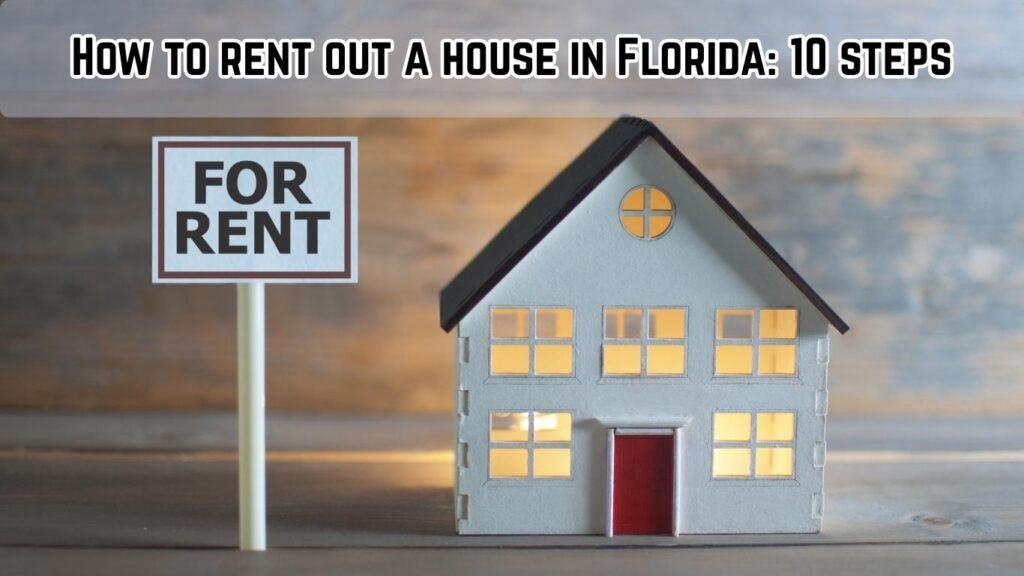Renting out a house in Florida can be a profitable way to earn passive income, whether you’re looking to rent long-term or offer a vacation rental. However, becoming a successful landlord requires more than just putting up a “For Rent” sign. It involves understanding local rental laws, preparing your property, pricing it competitively, and finding the right tenants.
With Florida’s booming population and strong tourism industry, there are plenty of opportunities, but it’s essential to navigate the process carefully.
In this guide, we’ll walk you through 10 important steps to help you rent out your property in Florida, ensuring you stay compliant, attract quality tenants, and maximize your rental income.
How to rent out a house in Florida: 10 easy ways
Here are 10 simple steps regarding how to rent out a house in Florida house
1. Ensure the Property Meets Local Rental Regulations
Before you start renting out your house in Florida, it’s crucial to ensure your property complies with local zoning laws and rental regulations. Florida has specific rules that vary by city or county, so it’s important to research what applies to your area.
- Zoning and Permits: Depending on your location, there may be restrictions on renting out properties for short-term use (e.g., Airbnb or vacation rentals). Make sure your property is zoned for rental purposes and check whether you need any special permits or licenses. Some cities, like Miami Beach and Orlando, have strict short-term rental regulations, so knowing the rules beforehand will save you time and hassle later.
- Occupancy Limits and Safety Standards: Florida law requires rental properties to meet certain health and safety standards, such as having working smoke detectors, safe plumbing, and properly functioning electrical systems. In addition, you should also be aware of occupancy limits based on the size of your property. Ensuring compliance with these standards helps prevent legal issues and ensures your tenants are safe.
2. Make Necessary Repairs and Improvements
Before listing your property for rent, it’s important to ensure it’s in excellent condition. Not only will this help you attract quality tenants, but it will also protect your investment in the long run. Here’s how to get your house ready:
- Fixing Repairs: Address any obvious issues such as leaks, broken appliances, or damaged flooring. Small problems, like a leaky faucet or cracked tiles, might seem minor but can negatively impact a potential tenant’s impression. Ensure the house is in top shape to avoid complaints and possible legal issues.
- Safety Checks: Florida’s rental laws require the property to meet certain safety standards. Make sure that all windows and doors are secure, that the house has functioning smoke detectors and carbon monoxide detectors, and that the heating, plumbing, and electrical systems are in good working order.
- Improving Curb Appeal: First impressions matter, so take time to enhance the exterior of your property. Mowing the lawn, trimming hedges, and adding a fresh coat of paint to the front door can make a huge difference in attracting prospective tenants. Curb appeal is particularly important for vacation rentals in Florida, where aesthetics play a key role in drawing in guests.
3. Set a Competitive Rental Price
Setting the right rental price is crucial to attracting the right tenants and ensuring your property generates a steady income. If you price too high, you may scare away potential renters; too low, and you could be leaving money on the table. Here’s how to determine the right price for your property:
- Research Local Market Rates: Check out similar properties in your area to get a sense of what others are charging. Websites like Zillow, Rentometer, and Craigslist can give you an idea of the going rates for houses similar to yours. Be sure to factor in key features like the number of bedrooms, bathrooms, amenities, and the property’s location.
- Consider the Seasonality: In Florida, rental prices can fluctuate depending on the season, especially in tourist-heavy areas. If you’re renting to vacationers, expect higher demand during peak tourist seasons (such as winter for snowbirds). For long-term rentals, you’ll need to consider factors like local employment rates and rental demand throughout the year.
- Understand Your Expenses: Be sure to account for property taxes, maintenance costs, insurance, and property management fees (if applicable). Make sure your rental price covers these costs while still allowing you to generate a profit.
4. Advertise Your Property
Once your property is ready to rent and you’ve set a competitive price, it’s time to market it. The more exposure your listing gets, the quicker you can find a quality tenant. Here are some effective ways to advertise:
- Online Rental Platforms: List your property on popular rental websites such as Zillow, Apartments.com, Craigslist, or even short-term rental platforms like Airbnb or Vrbo for vacation homes. These sites have a massive audience of renters actively searching for properties, so they’re essential for getting your property noticed.
- Social Media: Platforms like Facebook Marketplace and Instagram are excellent for reaching a local audience. You can post photos, share details about the property, and promote your listing to people in the area. If your property is a vacation rental, use attractive visuals to showcase the location and amenities.
- Local Networking: Word-of-mouth and local advertising still work wonders. Consider posting flyers in community centers, coffee shops, or nearby universities. Networking with local real estate agents can also help, especially if they have clients looking for rental properties.
5. Screen Potential Tenants
Finding the right tenant is one of the most important steps in renting out your house. Proper screening helps minimize risks, such as late payments, property damage, or eviction. Here’s how to thoroughly vet potential tenants:
- Background Checks: Run a background check to ensure the tenant has no criminal history. This is especially important if you’re renting to a large family or young professionals who will be living in your property for a long time.
- Credit Check: A credit report will give you insight into the tenant’s financial history. Look for a good credit score and signs of responsibility, such as paying bills on time. Typically, tenants should have a credit score of 600 or higher, though this may vary depending on your rental market.
- Rental History: Always ask for references from previous landlords. A reliable tenant should have a track record of paying rent on time and maintaining the property. If possible, contact past landlords to learn about their experience with the applicant.
- Income Verification: Ensure the tenant can afford the rent by verifying their income. A general rule of thumb is that tenants should earn three times the monthly rent. Asking for pay stubs or recent tax returns will help confirm their financial stability.
6. Draft a Lease Agreement
A well-written lease agreement is essential for protecting both you and your tenant. It outlines the terms and conditions of the rental arrangement and ensures both parties understand their responsibilities. Here’s what to include:
- Lease Term: Define the duration of the lease (e.g., one year, six months). For vacation rentals, specify the start and end dates.
- Rent Amount and Payment Terms: Clearly state the rent amount, due date, and preferred payment method. You should also include late payment penalties, as well as consequences for non-payment.
- Security Deposit: Specify the amount of the security deposit and the conditions under which it will be returned at the end of the lease. Florida law mandates that deposits be returned within 15-60 days after the tenant moves out, depending on the condition of the property.
- Maintenance and Repairs: Outline who is responsible for property maintenance, including minor repairs, lawn care, and utilities. As the landlord, you’ll need to outline how tenants should report issues and who is responsible for fixing them.
- Rules and Restrictions: Include any rules regarding pets, smoking, or making alterations to the property. Be sure to clarify your pet policy and if you allow any specific breed or weight limits for pets.
7. Collect a Security Deposit
Before handing over the keys, collect a security deposit from your tenant. This protects you against potential property damage, unpaid rent, or breaches of the lease agreement.
- How Much to Collect: In Florida, there’s no legal cap on how much you can charge, but most landlords request an amount equal to one or two months’ rent. For furnished or vacation rentals, you might consider a slightly higher deposit to cover wear and tear.
- Handling the Deposit Legally: Florida law requires landlords to place the security deposit in a separate, interest- or non-interest-bearing bank account and provide written notice to the tenant within 30 days of receiving the deposit. This notice should include the name of the bank, account type, and whether interest will be paid.
- Returning the Deposit: After the tenant moves out, you have 15 days to return the full deposit if there are no deductions. If you’re deducting for damages, you must notify the tenant within 30 days, providing an itemized list. Always document any damages with photos and written records.
8. Set Up Rent Collection and Payment Methods
Establishing a simple and reliable system for rent collection will save you time and reduce the risk of late or missed payments.
- Choose a Payment Method: Today’s tenants appreciate flexible, digital payment options. Consider using platforms like Zelle, Venmo, PayPal, or property management tools like Cozy, Avail, or Buildium. These options make it easier to track payments and reduce disputes.
- Establish Clear Terms: Specify the rent amount, due date, grace period (if any), and late fees in your lease agreement. For example, you might include a 5-day grace period followed by a $50 late fee.
- Automate Reminders: Send monthly reminders a few days before rent is due. Many property management platforms offer automatic reminders via email or SMS.
- Keep Records: Always keep a record of payments received and any communication with tenants regarding rent. This is especially helpful if issues arise and you need documentation for legal purposes.
9. Maintain the Property and Address Tenant Concerns
Once your tenant is settled in, it’s crucial to maintain the property and address any issues that arise promptly. Happy tenants are more likely to renew their lease, and well-maintained properties retain their value.
- Regular Maintenance: Schedule routine maintenance tasks, such as HVAC inspections, lawn care, pest control, and plumbing checks. It’s better to stay on top of minor issues before they become costly repairs. Florida’s humid climate means mold and mildew can be a problem, so ensure the property stays dry and well-ventilated.
- Respond Quickly to Requests: Whether it’s a leaking pipe or a broken appliance, always address maintenance issues as soon as possible. Florida tenants, especially in high-humidity areas, may experience issues like mold, so responding quickly is key to avoiding health hazards and costly repairs.
- Tenant Communication: Set up clear lines of communication with your tenants, whether it’s a phone number, email, or an online portal. Encourage tenants to report any issues or concerns promptly. Being responsive and approachable will help foster a positive landlord-tenant relationship.
10. Comply with Florida’s Landlord-Tenant Laws
Florida has specific landlord-tenant laws that you must adhere to in order to avoid legal issues and ensure a smooth rental process. Understanding and following these laws is vital for both you and your tenant’s protection.
- Right to Entry: Florida law requires landlords to give tenants at least 12 hours’ notice before entering the property, except in emergencies. Make sure to follow this protocol to avoid trespassing complaints.
- Eviction Process: In case of non-payment or lease violations, you must follow the legal eviction process. Florida has a formal process for eviction, including notice requirements and court proceedings. Ensure you’re familiar with the eviction laws before pursuing this option.
- Security Deposits: Florida has strict guidelines on how security deposits must be handled, including timely return after the tenant moves out. If any deductions are made, you must provide the tenant with an itemized list.
- Fair Housing Laws: Make sure you’re compliant with both federal and state fair housing laws, which prohibit discrimination based on race, color, religion, sex, national origin, disability, or familial status. Understanding these protections will help ensure you avoid legal issues related to discrimination.
Conclusion
Renting out a house in Florida can be a rewarding investment opportunity, but it requires careful planning and attention to detail. By following these 10 steps—from ensuring your property complies with local regulations to maintaining positive communication with tenants—you can create a seamless rental experience and protect your investment.
Whether you’re renting out a long-term home or a short-term vacation rental, setting competitive prices, drafting a clear lease agreement, and addressing maintenance issues promptly are key to maintaining a successful rental business. Florida’s growing population, booming tourism industry, and favorable tax laws make it an appealing place for rental properties, but being well-prepared and informed is essential to maximizing your profits and avoiding legal pitfalls.
By taking the time to set up your rental property correctly, you’ll be well on your way to a profitable and hassle-free rental experience in the Sunshine State.




